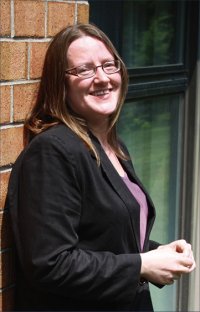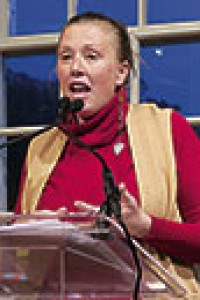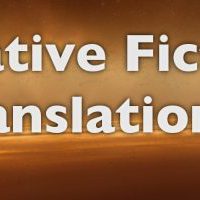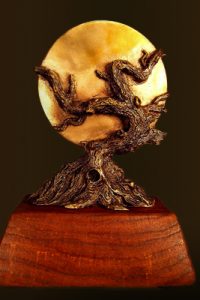Elizabeth Bear: Earthly Conventions
 Sarah Bear Elizabeth Wishnevsky was born in Hartford CT. She attended the University of Connecticut, where she studied English and Anthropology, though she did not take a degree. She has worked as a technical writer, stable hand, reporter, and in assorted office jobs, and has been writing full-time for the past several years. She married Christopher Kindred in 2000, divorcing in 2007.
Sarah Bear Elizabeth Wishnevsky was born in Hartford CT. She attended the University of Connecticut, where she studied English and Anthropology, though she did not take a degree. She has worked as a technical writer, stable hand, reporter, and in assorted office jobs, and has been writing full-time for the past several years. She married Christopher Kindred in 2000, divorcing in 2007.
Bear sold a few short stories to small-press publications in the ’90s, but began writing seriously in 2001. Notable stories include the Tiptree Award long-listed ‘‘This Tragic Glass’’ (2004), British SF Award finalists ‘‘Two Dreams on Trains’’ (2005) and ‘‘Sounding’’ (2006), Sidewise Award nominee ‘‘Les Innocents/Lumiere’’ (2007), WSFA Small Press Award finalist ‘‘Orm the Beautiful’’ (2007), Hugo and Sturgeon Memorial Award winner ‘‘Tideline’’ (2007), Hugo Award Winner ‘‘Shoggoths in Bloom’’ (2008), and World Fantasy Award finalist Bone and Jewel Creatures (2010). Some of her short work has been collected in The Chains that You Refuse (2006) and Shoggoths in Bloom (2012).
First novel Hammered (2005) began the Jenny Casey trilogy, which also includes Scardown (2005) and Worldwired (2005). She has two standalone novels – Carnival (2006) and Undertow (2007) – but mostly writes in various series.
Her sprawling Promethean Age fantasy sequence includes Blood and Iron (2006), Whiskey and Water (2007), Ink and Steel (2008), Hell and Earth (2008), and the forthcoming One-Eyed Jack (2013). The SF Jacob’s Ladder trilogy includes Dust (2007), Chill (2010), and Grail (2011), and post-apocalyptic fantasy the Edda of Burdens includes All the Windwracked Stars (2008), By the Mountain Bound (2009), and The Sea Thy Mistress (2011). She has published many stories and novellas set in an alternate history with magic inspired by the work of Randall Garrett: titles in this New Amsterdam sequence include New Amsterdam (2007), Seven for a Secret (2009), The White City (2011), ad eternum (2012), and a forthcoming collection. The Eternal Sky series began with Range of Ghosts (2012) and continues with the forthcoming Shattered Pillars (2013).
With Sarah Monette she writes the Iskryne series, a savage deconstruction of ‘‘animal companion’’ fantasies: A Companion to Wolves (2007), A Tempering of Men (2011), and forthcoming An Apprentice to Elves (2013). Since 2007 Bear has collaborated on web serial Shadow Unit, a supernatural FBI procedural, with Emma Bull, Sarah Monette, Will Shetterly, Leah Bobet, and Holly Black. She also helps host Hugo Award-winning podcast SF Squeecast. Bear won the Campbell Award for Best New Writer in 2005, and has taught at writing workshops Viable Paradise and Clarion West.
After spending several years in Las Vegas, she returned home to New England in 2006. Her partner since 2011, fantasy writer and firefighter Scott Lynch, lives in Wisconsin.
Excerpts from the interview:
‘‘In 2001, I turned 30, 9/11 happened, and I got laid off from my job within a 30-day period, and I may have had a slight existential crisis. Las Vegas suffered very badly in the Post-9/11 economic crash, because it’s all airplanes, so there was no tourist trade. I wound up being put on half-time, then laid off. There were no temp jobs, so I was on unemployment, and it was driving me crazy. I had been working 10 to 12 hours a day at my job, trying to get to the gym, and trying to have a relationship with my then-husband. I wouldn’t say I had abandoned writing, but it was definitely on the shelf. Then suddenly I found myself with all of this free time, and carrying this emotional wound. I grew up in the northeast, and I spent a lot of time in New York, so I was having a hard time dealing with 9/11 emotionally. There’s only so much TV you can watch. So I started writing again.
‘‘At that time, some of my friends (who were somewhat worried about me) sent me links to what was then the Del Rey Online Writing Workshop – which is now just the Online Writing Workshop, and which (in one of those weird ironies) now employs me as an editor! We all just kind of glommed onto each other, and hauled each other up by our bootstraps.
‘‘I have this reputation of being an extremely fast writer, and I’m not. When I think of a fast writer, I think of Catherynne Valente, who can literally sit down and write a novel in two weeks. I can’t do that. I did once, after a four-day cross-country drive where I had nothing to do but think, write a short novel in about a month. Though it wasn’t the cleanest first draft I’ve ever written, all I wound up doing with that was changing one of the characters’ points of view from first-person to third-person. You can plot a short novel in four days, if all you have to do is stare at Nebraska.
‘‘For the next three years, I basically had hypergraphia. There was one year where I wrote almost three-quarters of a million words, writing 10-12 hours a day. (I had lost a job, so that time and energy needed to go somewhere!) In college, I did a stint as a journalist, and you get trained to produce the words, but I think my best day ever was 7,000 words – and that was a 20-hour day! I love it when I can get in the zone and just sit down and type a story, and then go back and read it and say, ‘Wow, this came out of my head?’ Lately that happens less and less often. I seem to be in a place in my professional development where everything is much more work. I’m pleased with the quality, but the process is very much up in my head, all very conscious.”
…
 ‘‘I have heard from a number of friends, of Asian and African descent, about how frustrating it is to see how focused Western fantasy is on the history of medieval Europe. With Range of Ghosts, I wanted to write a book for them and their kids, that would in some way honor their heritage. There are obviously issues of cultural appropriation, which is one of the reasons I wanted to make it very plain that this is not real history: it’s not my history to play in. But I also think it’s necessary for us as a genre to be more aware of the world outside of fake-medieval Germany and fake-medieval England.
‘‘I have heard from a number of friends, of Asian and African descent, about how frustrating it is to see how focused Western fantasy is on the history of medieval Europe. With Range of Ghosts, I wanted to write a book for them and their kids, that would in some way honor their heritage. There are obviously issues of cultural appropriation, which is one of the reasons I wanted to make it very plain that this is not real history: it’s not my history to play in. But I also think it’s necessary for us as a genre to be more aware of the world outside of fake-medieval Germany and fake-medieval England.
‘‘One of my best friends is a direct male-line descendent of Genghis Khan. She has the documentation to prove it. I got fascinated by the way Genghis Khan is portrayed, as opposed to the way Alexander the Great is portrayed. They both won! In Mongolia, Genghis Khan is a culture hero, still to this day. The stuff that he accomplished, on a technological level and on a social level, is astounding. The Mongol Empire had bankruptcy laws. The third time you declared bankruptcy, they executed you, but that might not be a bad thing for us – it might solve some of our Wall Street problems.”
…
‘‘While there are more than two categories of story, obviously, there are two broad, general categories that talk about experience: insider stories and outsider stories. The easiest way for me to talk about this is via a five-year-old movie, Brokeback Mountain. I grew up in a queer family, so this is part of my zeitgeist. There was a lot of resistance to Brokeback Mountain in the queer community, because at the end of the movie one of the two lovers dies, making it a tragic love story. And the gay community is really sick of, ‘You can only be gay if you’re dead.’ The thing is, it’s a story about two gay men that was written by a white heterosexual woman and directed by an Asian heterosexual man. It takes this sort of quintessentially gay experience of being closeted and passionately, desperately in love with somebody you can’t have, because society won’t let you. There’s a reaction from some queer viewers, ‘Why didn’t they just go to fucking San Francisco?’ But that was outside the characters’ experience, so it was not an option.
‘‘What that movie successfully did was create a watershed in how straight people think about gay people, because it universalized the experience of being in love with somebody you can’t have and made it acceptable to heterosexuals. Whereas the Torch Song Trilogy, a brilliant movie in the heroic-drag-queen subgenre, is about a very flamboyant gay man – a drag queen – attempting to find love and happiness in 1980s New York, in the midst of a lot of anti-gay backlash. That’s an insider story.
‘‘In writing Range of Ghosts, I was very aware that I cannot write an insider story about a mythic, precolonial-era Asia. I cannot write a story from the perspective of somebody who was living that. All I can do is try to create an outsider story that’s not too terribly exploitative.’’



 Read the complete interview, and biographical profile, in the
Read the complete interview, and biographical profile, in the 



Pingback:The Great Geek Manual » Geek Media Round-Up: December 19, 2012
Pingback:Geek Media Round-Up: December 20, 2012 – Grasping for the Wind